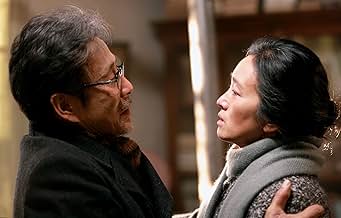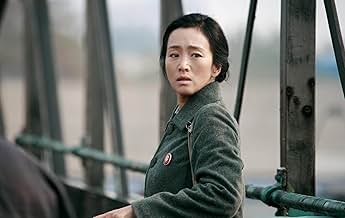NOTE IMDb
7,2/10
7 k
MA NOTE
Ajouter une intrigue dans votre langueLu and Feng are a devoted couple forced to separate when Lu is arrested and sent to a labor camp as a political prisoner during the Cultural Revolution. He finally returns home only to find ... Tout lireLu and Feng are a devoted couple forced to separate when Lu is arrested and sent to a labor camp as a political prisoner during the Cultural Revolution. He finally returns home only to find that his beloved wife no longer recognizes him.Lu and Feng are a devoted couple forced to separate when Lu is arrested and sent to a labor camp as a political prisoner during the Cultural Revolution. He finally returns home only to find that his beloved wife no longer recognizes him.
- Réalisation
- Scénario
- Casting principal
- Récompenses
- 23 victoires et 49 nominations au total
Avis à la une
Spielberg "cried for an hour" did not lie. I felt like I had been stabbed and watched, and I felt like I was dehydrated when I left the cinema. The Chinese love, which is not fast-paced, is surrounded by the times and shows two sides.
Coming Home is a great example of the way in which a movie can move you, play on your emotions, without being sentimental in a negative sense. Without being a tear-jerker. And without harsh images of struggle and war. But with excellent acting, small gestures and not so much words. This movie is all about empathy, first among the characters in the story depicted, but by consequence also among the audience, that is swept away and taken in by the sentiment.
This doesn't mean that the story is only about love and compassion. The Cultural Revolution in China (1966-1976) was far from being peaceful and compassionate. People were separated for years without any information, were forced to report any 'wrong' behavior that could 'harm' or 'threaten' the Communist Party. Coming Home shows how such an environment affects people at the individual, family level. People get damaged and family relations are shattered because of betrayal.
Coming Home succeeds in portraying the consequences of such a regime, by showing what humanity and compassion mean. And that is what makes it special, and refreshing in a world where it sometimes feels like these values are hard to find.
This doesn't mean that the story is only about love and compassion. The Cultural Revolution in China (1966-1976) was far from being peaceful and compassionate. People were separated for years without any information, were forced to report any 'wrong' behavior that could 'harm' or 'threaten' the Communist Party. Coming Home shows how such an environment affects people at the individual, family level. People get damaged and family relations are shattered because of betrayal.
Coming Home succeeds in portraying the consequences of such a regime, by showing what humanity and compassion mean. And that is what makes it special, and refreshing in a world where it sometimes feels like these values are hard to find.
In China, in the early 70s, Lu Yanshi (Daoming Chen), a political prisoner, is released at the end of the Cultural Revolution. When he returns home, he discovers that his wife Feng Wanyu (Gong Li) is suffering from amnesia: she waits every day for the return of her husband, without understanding that he is at her side.
I loved the infinite tenderness that emerges from this film. The rhythm of the film is intentionally slow and we feel a real chemistry between the three main actors (father, mother and daughter). The director Yimou Zhang immerses us in a beautiful love story with the poignant beauty and intense presence of the actress Gong Li, with the extraordinary talent of the actor Daoming Chen who plays soberly in the shadow of his wife, with a neat, delicate and graceful photography.
As a synthesis: behind a slight facade of political pamphlet, a delightful ode of lyricism. 8/9 of 10
I loved the infinite tenderness that emerges from this film. The rhythm of the film is intentionally slow and we feel a real chemistry between the three main actors (father, mother and daughter). The director Yimou Zhang immerses us in a beautiful love story with the poignant beauty and intense presence of the actress Gong Li, with the extraordinary talent of the actor Daoming Chen who plays soberly in the shadow of his wife, with a neat, delicate and graceful photography.
As a synthesis: behind a slight facade of political pamphlet, a delightful ode of lyricism. 8/9 of 10
I had high expectation for Zhang Yimou's latest film Coming Home, because he finally went back to tell a simple and plain story. So when I heard there was an advanced screening on May 11, I immediately went to see it. However, after watching this 111-minute movie, I was disappointed. To be precisely, I had mixed feeling about the film, I think it is Zhang's best film since House of Flying Daggers, however it is still not a good film. The story is simple, the cinematography is simple, everything is simple in this film, just like what Zhang promised. He intended to make everything simple, trying so hard to drop his color- using style and maintain simple. However, such simpleness is intended, it is not natural. For simple life story movies (Yi Yi, Platform, The World, A Simple Life), the key to be a great movie is if it could give audience a special feeling and a deep theme through its simpleness. And such thing behind its simpleness is the soul of the movie. However, Coming Home didn't achieve that, I can barely feel anything behind its intended simpleness and schmaltz. Its soul is empty. Still, I have to admit, there are some good sides of the film, especially Gong Li and Chen Daoming's amazing acting. Their performances are superb, one of the best performances I've seen in recent years. Also, I love the well-crafted first 10-minute and the sentimental ending. All in all, I appreciated Zhang's trying of going back to the simple and I wish he could continue that. Coming Home may not be a fantastic film but it is still a well-crafted movie with some touching moments. My score: 7.1
(PS: To understand the film ,be sure to learn some background information and the history about the Cultural Revolution. Due to the censorship in China, Zhang can't tell something about the story too obvious, so if you know nothing about that history, you will be confused by something happens in the film.)
(PS: To understand the film ,be sure to learn some background information and the history about the Cultural Revolution. Due to the censorship in China, Zhang can't tell something about the story too obvious, so if you know nothing about that history, you will be confused by something happens in the film.)
Some of the dialog at the very beginning not quite correct and right during the Chinese Culture Revolution. The Chinese people in that darkest ten years torment, many jargon would not be said like what we heard in this movie. If the protagonist is a "Spy" as his daughter called him, he would already have been shot instead of banished to a far away poor farm as a labor. Such labors at that time were tagged as "Anti-Revolutionist" , "The Left Extremist", "Stinking Old Nine" or "The 5th Black Category Member". There were many carelessly written labeling names or words that didn't comply with that atrocious era. I was just amazed how the billion Chinese would let go of such torturous and treacherous when the Culture Revolution lost its goal and suddenly ended after 10 years living hell. Most Chinese are not like the Jewish people who had suffered so much that they would never let it go and so easily forget what their ancestors suffered. But the Chinese people are such weird species with extremely short memory. When every absurd but cruel movement ended, what they had experienced was just like the old Western saying: "Water under The Bridge", they just took it for granted and awaiting the next movement coming up to torture them. This is also explained why the CCP regime still exists so far, and again, the Chinese people are suffering the prison-like deadly control during a lightweight Omicron virus crisis. They are whining, crying and complaining, but I guess when the CCP decides to end the siege, they would immediately forget what they once suffered, just like what their parents and grandparents had suffered during the Cultural Revolution. Living under the iron fist of the CCP, Short Memory, Letting Go and Moving On maybe are all must-have for the 1.4 billion Chinese subjects?
Le saviez-vous
- AnecdotesComing Home (2014) had its international premiere at the 2014 Cannes Film Festival in the out of competition section. It was scheduled to be screened in the Special Presentations section of the 2014 Toronto International Film Festival.
- ConnexionsFeatured in Sven Uslings Bio: Bästa filmer 2020 Del 1: Plats 20-11 (2021)
- Bandes originalesSong of the Fishermen
Written by Ren Guang
Arranged by Quigang Chen
Meilleurs choix
Connectez-vous pour évaluer et suivre la liste de favoris afin de recevoir des recommandations personnalisées
- How long is Coming Home?Alimenté par Alexa
Détails
- Date de sortie
- Pays d’origine
- Site officiel
- Langue
- Aussi connu sous le nom de
- The Criminal Lu Yanshi
- Lieux de tournage
- Sociétés de production
- Voir plus de crédits d'entreprise sur IMDbPro
Box-office
- Montant brut aux États-Unis et au Canada
- 377 607 $US
- Week-end de sortie aux États-Unis et au Canada
- 26 361 $US
- 13 sept. 2015
- Montant brut mondial
- 47 587 984 $US
- Durée
- 1h 49min(109 min)
- Couleur
- Mixage
- Rapport de forme
- 2.35 : 1
Contribuer à cette page
Suggérer une modification ou ajouter du contenu manquant























